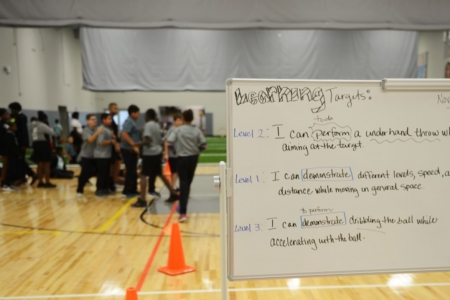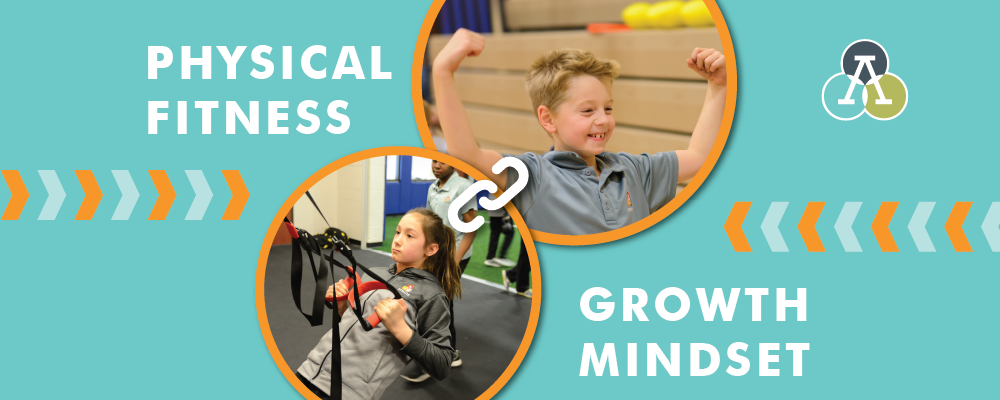The Athlos athletic curriculum is designed to help students experience success in athletic movement, grow confidence to take on new challenges, develop a growth mindset, and learn what it means to have a healthy body.
Every student is an athlete.
Many children grow up believing that athletes are born to jump, run, and leap like they see in major sports leagues, when that couldn’t be further from reality.
Athlos believes students can learn that athleticism is a skill that can be achieved no matter their age, height, gender, or body type. We do this by first defining an “athlete” as an active, fit, and efficient mover.

“The Athletic academic curriculum (AAC) helps develop a growth mindset for students by introducing a clear path for learning new movements associated with increased competency within movement and sport,” said Chandler Herdt, an Athlos Healthy Body expert, “The curriculum acts more as a framework that introduces new skills in a developmentally-appropriate way.”
“The goal is to help students realize that athleticism in not innate, that it can be developed no matter who you are.”
– Chandler Herdt
Athlos is changing what it means to be an athlete. It’s more than just physical education, it’s a curriculum designed to show children that through effort and hard work, they can have a healthy body.
By simply viewing athleticism as movement and sports skills, it changes a child’s fixed mindset from being “athletic or not” to realizing that by learning these skills and applying what they learn, they can become more athletic.
Athlos inspires lifelong health habits through personal achievement and physical growth.

Many adults don’t lead active lifestyles simply because they lack confidence in their physical abilities. The goal behind the curriculum is to inspire individuals to pursue physical activity and healthy lifestyle habits they will take into adulthood.
By incorporating a growth mindset in the athletic curriculum, we’re helping students learn where they are in their physical abilities, set realistic goals, and gain confidence in their achievements.
“Ultimately, if students begin to identify as an athlete or that athletic movement is an area where they can experience success, they’ll continue to take on movement challenges, keeping them more engaged in physical activity, and hopefully leading to a healthier lifestyle,” Herdt said.
Coaches play a key role in student success
Athlos’ athletic performance coaches strive to help students develop a growth mindset in their physical abilities by guiding them in setting and achieving realistic goals.
“It’s the coaches’ role to ensure that the curriculum is differentiated in a way that allows students to have success, and realize that athletic movement is a teachable skill, and increased athleticism is available for all students,” Herdt said.
There are three “R’s” athletic performance coaches use:
- Review the learning target for the day
- Reflect on the role of Performance Character in that lesson
- Recognize students for displaying various Performance Character traits

Within each of the three Rs there are elements of a growth mindset, such as how the learning targets are like mini, daily goals that help students see growth and learning in the skill focus of the day.
“A growth mindset is realized when students experience success early on and when coaches create a culture of growth and positivity where risk taking, reflection, and goal setting are celebrated and reinforced,” Herdt said.
 Remember to set goals and use a growth mindset language
Remember to set goals and use a growth mindset language
Setting realistic goals and using optimistic, supportive language are keys to facilitating a growth mindset for anyone pursuing physical activity, especially in student athletes.
By setting goals, children can develop habits to pursue something that they find important. Over time, they will begin to understand that they can improve regardless of where they are starting.
“I think it’s important to celebrate progress and utilize tools that will reveal areas of growth,” Herdt said. “Goal setting is a good tool for this. Experiencing small wins along the way can keep you motivated.”
Language effects progress and confidence
Students often underestimate their limit for skills, making it easy to self-doubt. Coaches and parents can reinforce positive, supportive language by modeling the use of growth mindset language when goals are achieved, and helping students adjust from a fixed mindset language when goals aren’t met.
Overall, as students learn what it means to have a healthy body, they learn that more so than talent or innate ability, dedication and hard work are more important in achieving physical fitness goals.
In the Athlos curriculum, it’s important that students and coaches work together to make goals, overcome challenges, and create healthy lifestyle habits. When students see their progress, they gain self-confidence, develop a growth mindset, and learn that physical activity is not only something they can do, but something they can enjoy.


 Remember to set goals and use a growth mindset language
Remember to set goals and use a growth mindset language